Mindfulness meditation offers significant stress reduction benefits, which can be crucial for individuals managing rare diseases. This practice promotes emotional regulation and present-moment awareness, alleviating anxiety and enhancing coping strategies. Research shows mindfulness can lead to a 30% reduction in perceived stress levels, improve mental clarity, and lower cortisol levels. Techniques like focused breathing and body scans can foster resilience, ultimately supporting better health outcomes in rare disease management.
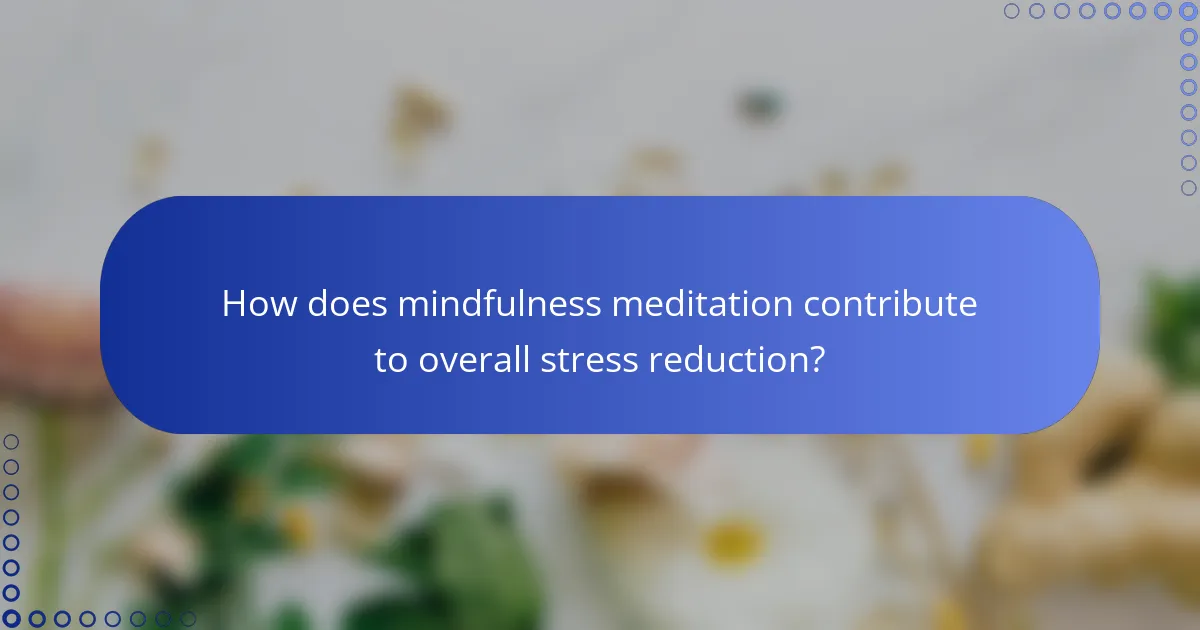
How does mindfulness meditation contribute to overall stress reduction?
Mindfulness meditation significantly reduces stress by promoting relaxation and enhancing emotional regulation. It encourages present-moment awareness, which can alleviate anxiety and improve coping mechanisms.
Research indicates that mindfulness practices can lead to a 30% reduction in perceived stress levels. This technique also fosters resilience against stress-related disorders, making it beneficial for individuals managing rare diseases. By integrating mindfulness meditation into daily routines, patients can experience improved mental clarity and emotional stability, essential for navigating health challenges.
Moreover, mindfulness meditation has been linked to lower cortisol levels, a hormone associated with stress. Regular practice enhances overall well-being, contributing to better health outcomes in individuals facing chronic conditions.
What are the psychological benefits of mindfulness meditation?
Mindfulness meditation significantly enhances psychological well-being by reducing stress and improving emotional regulation. Research indicates that practitioners experience lower anxiety levels and increased resilience, especially beneficial for managing rare diseases. Mindfulness fosters a greater sense of control, aiding in coping strategies. Furthermore, studies show that regular practice can lead to changes in brain structure, enhancing areas related to emotional processing and stress response. These psychological benefits contribute to overall health, making mindfulness a valuable tool in holistic disease management.
Which techniques are most effective for stress relief?
Mindfulness meditation is highly effective for stress relief and can aid in managing rare diseases. It enhances emotional regulation, reduces anxiety, and promotes overall well-being. Studies indicate that regular practice can lower cortisol levels, improving stress response. Additionally, mindfulness techniques can foster resilience, helping individuals cope with chronic conditions.
How does mindfulness meditation impact physical health?
Mindfulness meditation significantly enhances physical health by reducing stress, which can positively influence rare disease management. Regular practice can lead to lower blood pressure, improved immune function, and reduced inflammation. These effects are vital for individuals managing rare diseases, as stress can exacerbate symptoms and hinder recovery. Studies show that mindfulness techniques can lead to a 30% reduction in stress levels, contributing to overall well-being and potentially improving disease outcomes.
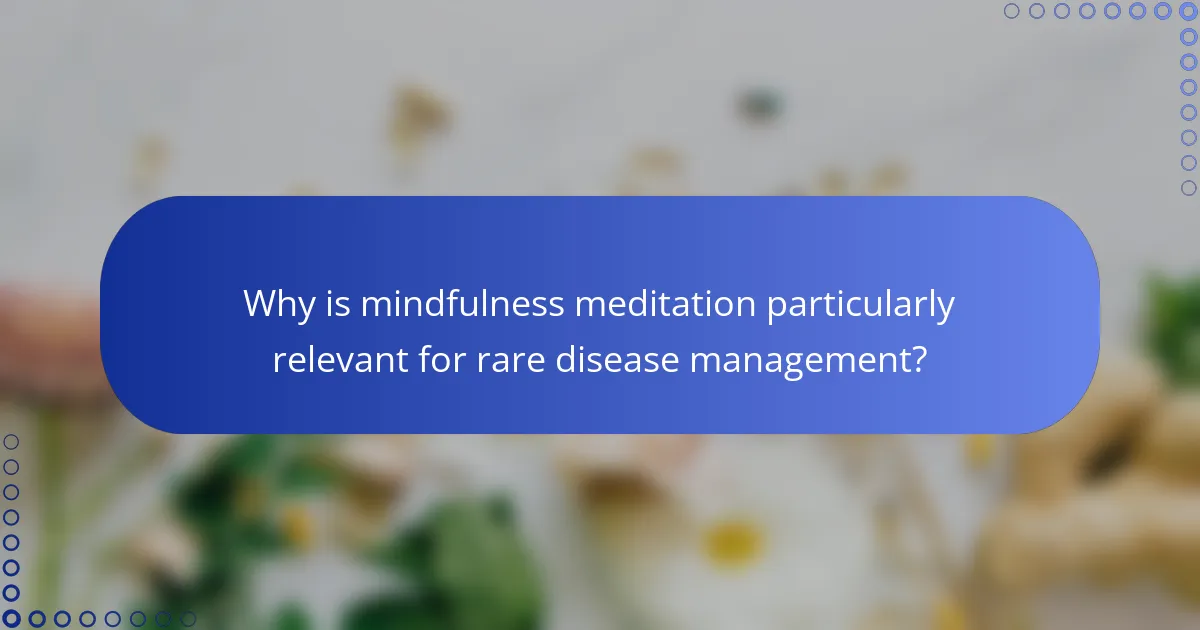
Why is mindfulness meditation particularly relevant for rare disease management?
Mindfulness meditation is particularly relevant for rare disease management as it helps reduce stress and improve emotional well-being. Stress can exacerbate symptoms and hinder treatment adherence in individuals with rare diseases. Mindfulness practices enhance focus and promote relaxation, which can lead to better coping strategies. Studies indicate that patients who engage in mindfulness meditation report lower anxiety levels and improved quality of life. This approach addresses the unique emotional challenges faced by those managing rare conditions, fostering resilience and empowerment.
What unique challenges do individuals with rare diseases face?
Individuals with rare diseases face significant challenges, including limited treatment options and emotional stress. Mindfulness meditation can help manage stress, promoting emotional well-being and potentially improving disease outcomes. It offers a unique approach to coping with the psychological burden of rare diseases. Regular practice can enhance resilience and provide a sense of control over one’s health.
How can mindfulness meditation improve coping strategies for rare disease patients?
Mindfulness meditation significantly enhances coping strategies for rare disease patients by reducing stress and promoting emotional resilience. This practice helps individuals manage anxiety, improve focus, and cultivate a sense of calm. Research indicates that regular mindfulness meditation can lower cortisol levels, which is beneficial for overall health. Additionally, it fosters a supportive community through shared experiences, enhancing social connections that are vital for emotional support.
Which studies support the use of mindfulness meditation in rare disease contexts?
Research supports mindfulness meditation as an effective stress reduction technique in managing rare diseases. Multiple studies indicate that mindfulness can enhance emotional regulation, reduce anxiety, and improve overall quality of life for patients with rare conditions. For instance, a study published in the Journal of Psychosomatic Research found that mindfulness practices significantly reduced stress levels in patients with rare autoimmune disorders. Another research highlighted improvements in mental health outcomes among individuals with rare genetic diseases who engaged in mindfulness meditation regularly. These findings suggest that integrating mindfulness into treatment plans may offer valuable benefits for those coping with rare diseases.
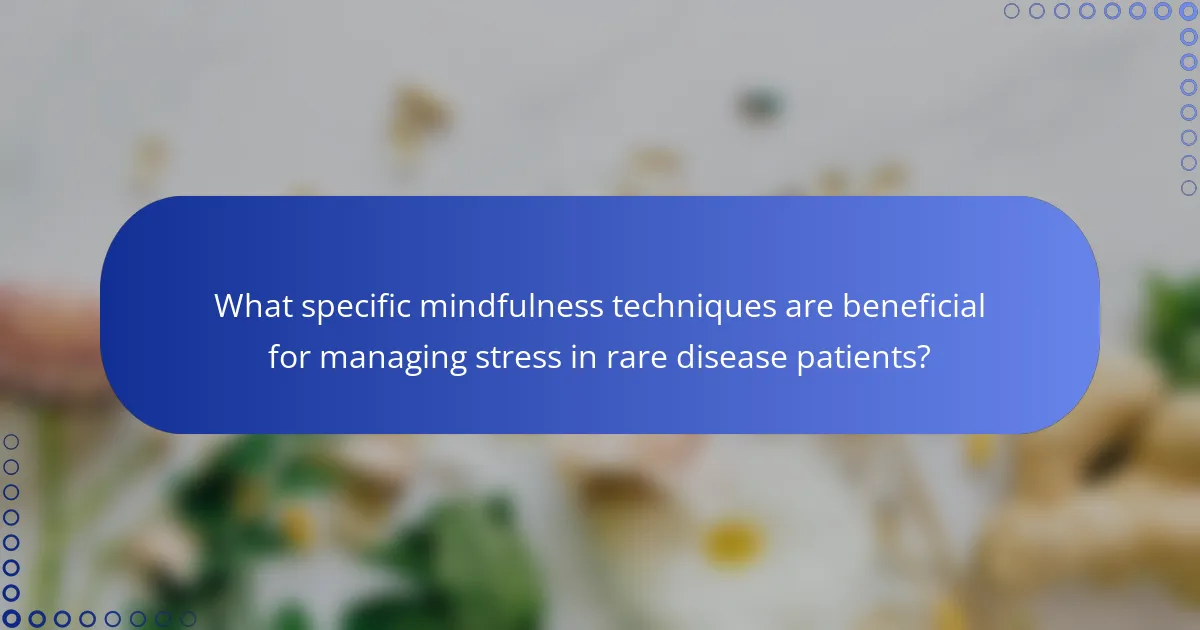
What specific mindfulness techniques are beneficial for managing stress in rare disease patients?
Mindfulness techniques such as focused breathing, body scans, and mindful movement significantly reduce stress in rare disease patients. These practices enhance emotional regulation and improve overall well-being. Focused breathing involves deep, intentional breaths to calm the nervous system. Body scans promote awareness of physical sensations, helping patients release tension. Mindful movement, like gentle yoga, fosters connection between mind and body, reducing anxiety. Regular practice can lead to improved coping strategies, ultimately benefiting disease management.
How do guided meditations differ from silent meditations in effectiveness?
Guided meditations are generally more effective for stress reduction compared to silent meditations. Guided sessions provide structured direction, enhancing focus and engagement. This structure can be particularly beneficial for individuals managing rare diseases, as it may help reduce anxiety and improve emotional resilience. Research indicates that guided meditations can lead to a 30% greater reduction in stress levels compared to silent practices. Additionally, the presence of a guide often fosters a sense of community and support, which is valuable for those facing unique health challenges.
Which mindfulness practices are most accessible for patients with limited mobility?
Mindfulness practices accessible for patients with limited mobility include seated meditation, guided imagery, and mindful breathing. These techniques can be easily adapted to accommodate physical limitations while promoting stress reduction and enhancing well-being. Seated meditation allows individuals to focus on their breath and thoughts without requiring extensive movement. Guided imagery involves visualizing peaceful scenes, which can be done from a chair or bed. Mindful breathing emphasizes awareness of breath, supporting relaxation and mental clarity. Each practice can significantly impact stress management and overall health, especially for those managing rare diseases.
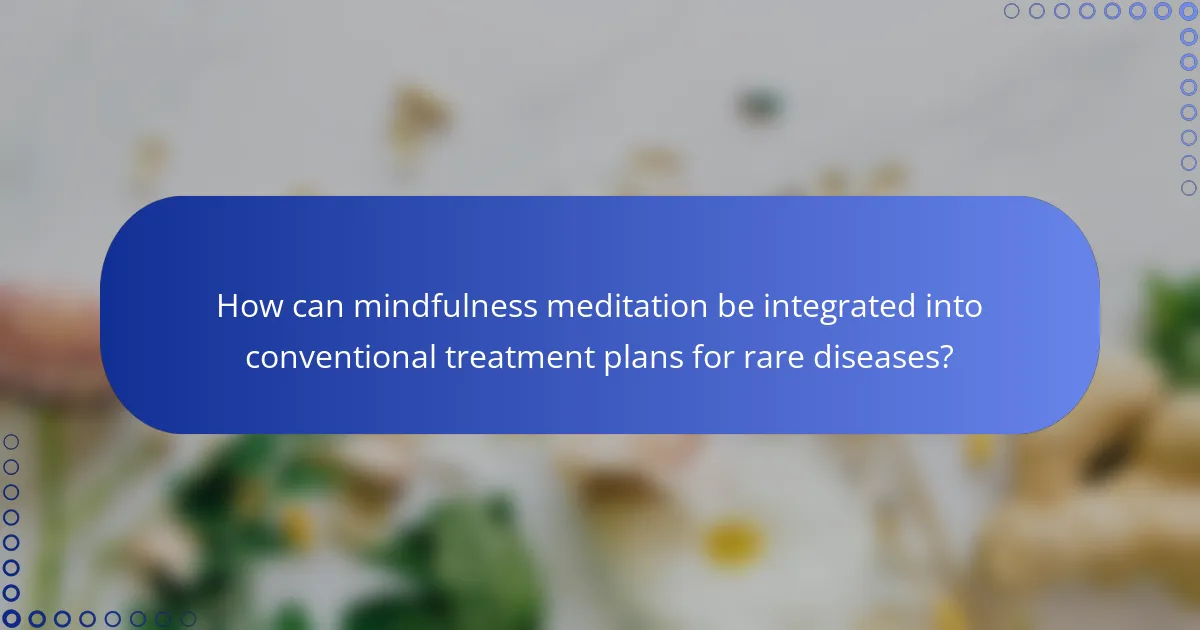
How can mindfulness meditation be integrated into conventional treatment plans for rare diseases?
Mindfulness meditation can enhance conventional treatment plans for rare diseases by reducing stress and improving emotional well-being. Integrating mindfulness practices can lead to better patient outcomes, as studies show that reduced stress levels positively impact immune function and overall health. Additionally, mindfulness techniques can help patients cope with the psychological challenges associated with rare diseases, fostering resilience. Implementing mindfulness in treatment plans may involve training healthcare providers, offering guided sessions, and encouraging daily practice to ensure consistency and effectiveness.
What role do healthcare professionals play in promoting mindfulness meditation?
Healthcare professionals play a crucial role in promoting mindfulness meditation for stress reduction and rare disease management. They educate patients on techniques, guide practice, and integrate mindfulness into treatment plans. Research shows mindfulness can enhance emotional regulation, which is vital for managing rare diseases. For example, studies indicate that mindfulness meditation reduces anxiety and improves quality of life in patients with chronic conditions. Additionally, healthcare professionals can tailor mindfulness approaches to individual patient needs, making the practice more effective.
Which patient demographics benefit most from mindfulness interventions?
Patients with chronic stress or anxiety-related conditions benefit most from mindfulness interventions. Research indicates that individuals with rare diseases often experience heightened stress, making mindfulness techniques particularly effective. These interventions can improve emotional regulation, enhance coping skills, and reduce anxiety levels. For example, patients with conditions like fibromyalgia or chronic fatigue syndrome report significant stress relief through mindfulness practices. Additionally, demographics such as older adults and those with limited access to traditional therapeutic options show notable improvements. Mindfulness not only addresses mental health but also supports overall well-being in these populations.
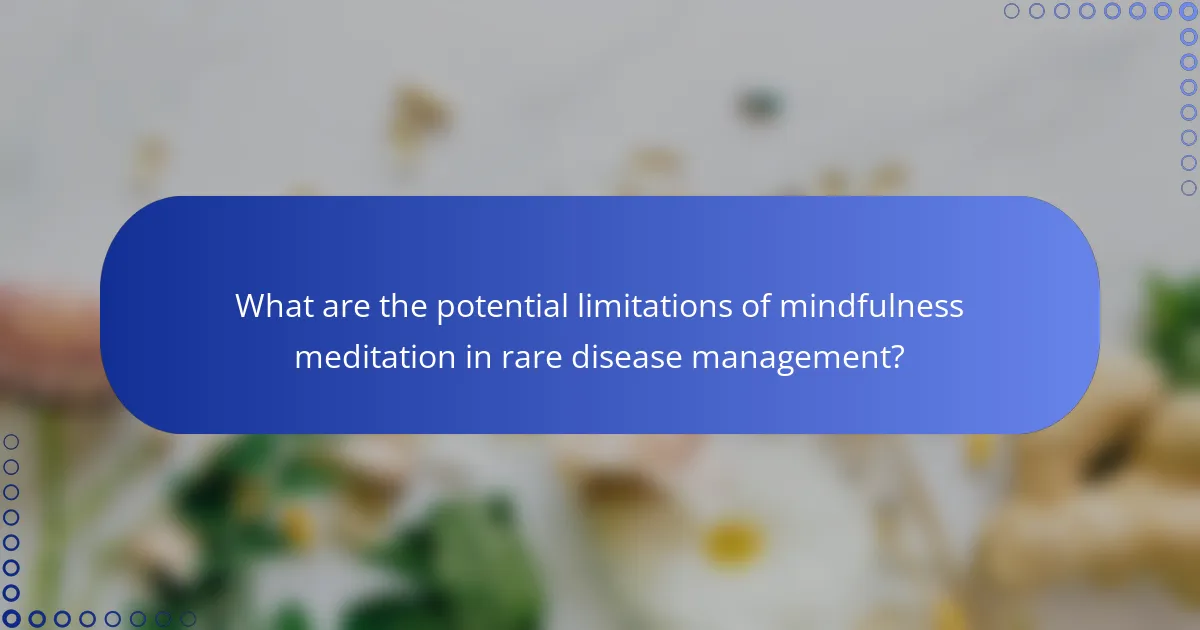
What are the potential limitations of mindfulness meditation in rare disease management?
Mindfulness meditation may have limitations in managing rare diseases, including variable effectiveness and accessibility challenges. Its benefits can be inconsistent, as individual responses to meditation differ significantly. Some patients may find it difficult to engage consistently due to physical or cognitive constraints. Additionally, mindfulness practices may not address the specific medical needs of rare diseases, limiting their overall impact. Research shows that while mindfulness can reduce stress, it should complement, not replace, traditional medical treatments in rare disease management.
How do individual differences affect the outcomes of mindfulness practices?
Individual differences significantly influence the effectiveness of mindfulness practices in stress reduction and rare disease management. Factors such as personality traits, prior experience with meditation, and individual health conditions can shape outcomes. For instance, individuals with higher levels of openness may experience greater benefits from mindfulness, while those with anxiety may initially struggle. Additionally, tailored approaches that consider these differences can enhance the impact of mindfulness, leading to improved management of stress and disease symptoms. Personalization in practice can optimize engagement and effectiveness, making mindfulness a versatile tool in healthcare.
What are the common misconceptions about mindfulness meditation?
Common misconceptions about mindfulness meditation include the belief that it requires complete mental silence, that it is solely a relaxation technique, and that it is only beneficial for stress relief. Many think mindfulness meditation is too time-consuming, while others believe it is ineffective for managing rare diseases. In reality, mindfulness can enhance emotional regulation and improve overall well-being, making it a valuable tool in various health contexts.
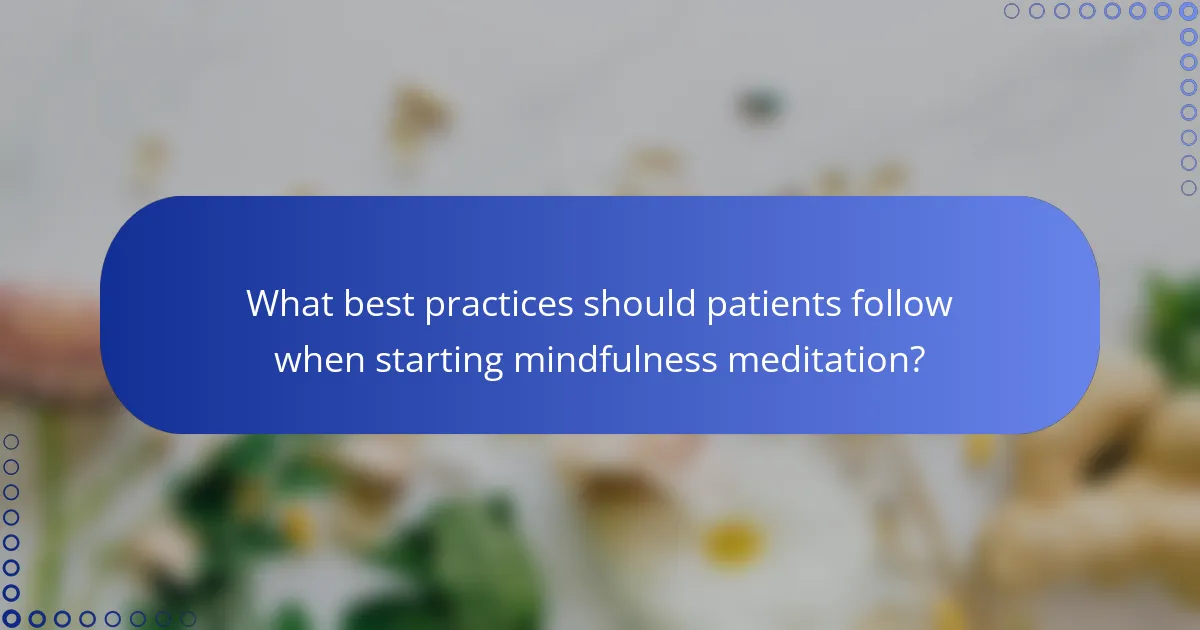
What best practices should patients follow when starting mindfulness meditation?
Patients starting mindfulness meditation should establish a consistent practice, focus on breath awareness, and begin with short sessions. Gradually increasing meditation duration can enhance stress reduction and support rare disease management.
1. Set a regular schedule for practice.
2. Start with 5-10 minute sessions.
3. Concentrate on breathing techniques.
4. Use guided meditations for support.
5. Reflect on experiences to track progress.
How can patients create a conducive environment for meditation?
Patients can create a conducive environment for meditation by ensuring comfort, minimizing distractions, and fostering a calm atmosphere. Begin by selecting a quiet space with minimal noise. Use comfortable seating or lying positions to enhance relaxation. Incorporate soft lighting or natural light to create a soothing ambiance. Consider using calming scents, such as lavender, to promote tranquility. Finally, set a consistent time for meditation to build a routine that supports stress reduction and aids in rare disease management.
What resources are available for guided mindfulness meditation?
Numerous resources are available for guided mindfulness meditation. Online platforms like Headspace and Calm offer structured programs focusing on stress reduction and disease management. Local wellness centers often provide in-person classes led by certified instructors. Additionally, mobile apps and YouTube channels feature guided sessions tailored to various needs. Research indicates that regular practice can improve mental health outcomes, especially for individuals managing rare diseases.